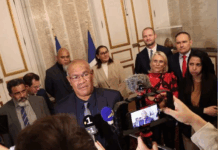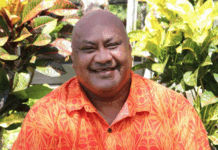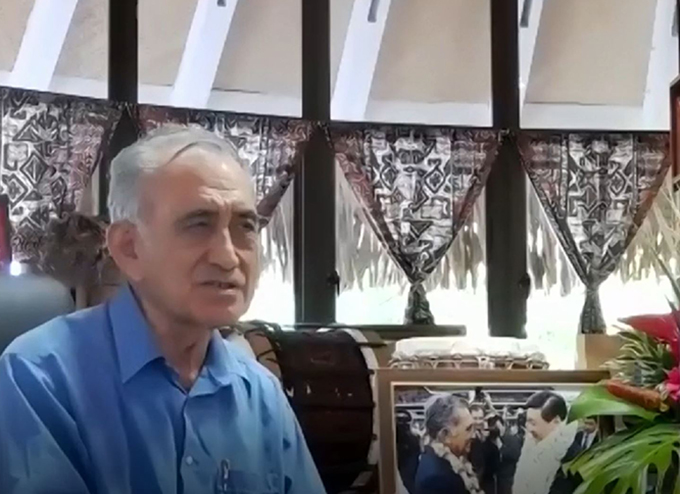
ANALYSIS: By Ena Manuireva
The unfolding in French Polynesia of the latest judiciary entanglements of pro-independence leader Oscar Temaru versus the French administration is being closely followed by members of the Tahitian community in Tahiti and in Aotearoa New Zealand.
There are undeniable similarities between Temaru’s upcoming trial on November 4 in Nouméa after many deferrals, and the expedient trial of Te metua – Pouvana’a a O’opa, the leading figure of the Ma’ohi people, 60 years ago.
Pouvana’a was accused of plotting to burn down Tahiti’s capital Pape’ete, but trumped up charges were made against him because of his fight for an independent Ma’ohi nation.
- READ MORE: 35 years on, Oscar Temaru guest in Rainbow Warrior rewind
- French nuclear tests: ‘I bury people nearly every day, what was our sin?’
- Tahiti’s Temaru challenges court over French judicial ethics
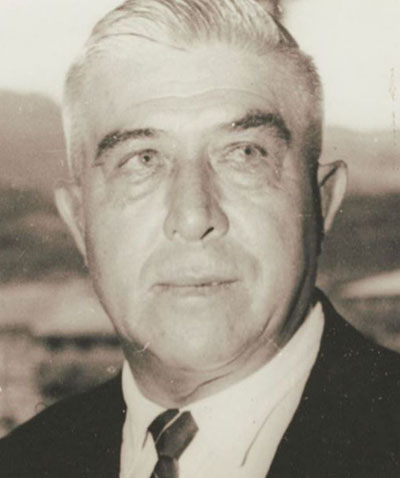
Exiled for 23 years to France after a mockery of a judgment, he was allowed back in Tahiti in 1968 after being pardoned.
Temaru’s judgment has all the makings of a déjà-vu. History is kind enough to remind us about the many disagreements and annoyances caused by Temaru to the French administration spanning more than 50 years:
- Temaru was arrested and jailed for protesting against the nuclear tests in Moruroa
- France’s military intervention in the French Polynesia presidential elections won by Temaru in 2004 for fear of social unrest
- Temaru put French Polynesia back on the UN decolonisation list in 2013, denouncing France’s non-commitment to decolonisation – the politics of the “empty chair” (1)
A string of anti-French actions that have displeased the Paris establishment and, to some extent, the local autonomist government.
So, what has been the straw that broke the camel’s back and why is this new trial so different that the French judicial machine felt justified in seizing money from Temaru’s personal bank account?
Background to the Radio Tefana affair
In June 2020, French prosecutor Herve Leroy seized NZ$145,000 from Temaru’s personal bank account after the former territorial president and current mayor of Faa’a was convicted of exercising undue influence because the court ruled that community Radio Tefana benefited his own pro-independence political party.
According to many lawyers in Tahiti and in France (the CNB – National Council of the Bar), this action suggested that Temaru had already been pre-judged of having “committed a crime” and the presumption of innocence was simply discarded by prosecutor Leroy.
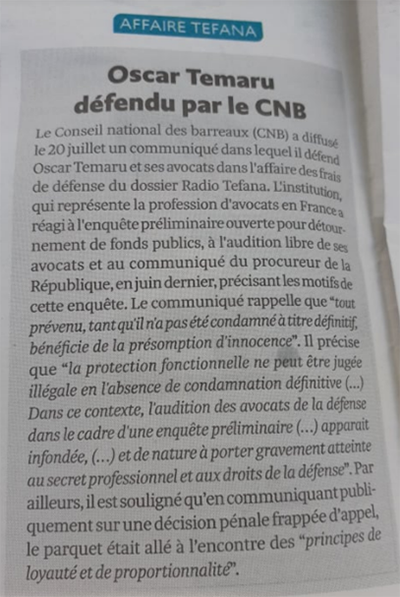
This trial can only be understood as a retaliation against Temaru’s decision in 2018 to take France’s living presidents to the International Criminal Court for alleged crimes against humanity over the nuclear weapons tests between 1966 and 1996. This was clearly the last straw for the French political establishment.
Questions related to why the French judiciary could not perform its duty on Tahitian soil but prioritised first the High Council for the Judiciary in France before deciding to send the case to Kanaky New Caledonia remains enigmatic to say the least.
There is overwhelming support for Temaru from the local Tahitian population – from the religious, the social, the political even judicial corners.
As mayor of the most populated district in French Polynesia, he refuses to be intimidated and from our personal communication, he has vowed to take the fight to the highest authority nationally or internationally.
In Nouméa, “our brothers and sisters Kanak”, as he calls them, are ready to welcome us and they will be a tremendous support during the trial – both indigenous people are fighting for their independence from France.
According to a close family member, Temaru is holding on for a trial expected to last 3 days (November 4-7) and has carried out a hunger strike and fasting since his six month suspended sentence and a fine of NZ$66,000 for this affair in 2019 (2) – despite his age at 76.
His fast was also to teach the population a new way of fighting obesity and all the various diseases that it causes. He is not advocating violence and unrest, but he is fighting legally through the courts.
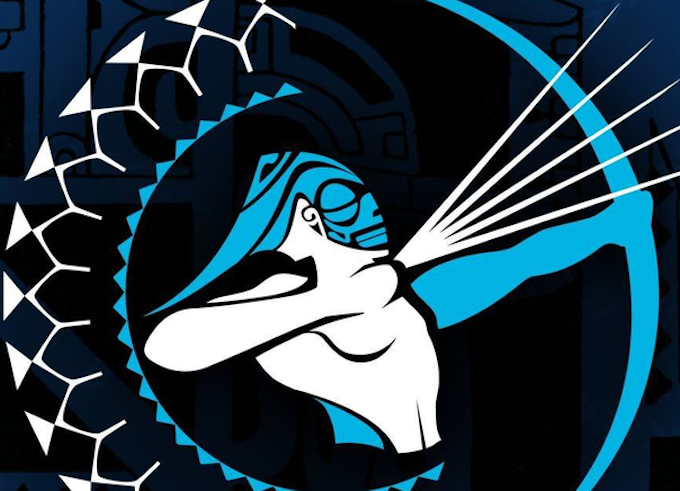
Temaru’s hopes about this trial
At a time when the media is being muzzled and reporters are being silenced worldwide, the voice of the pro-independence community Radio Tefana remains the only and last media platform calling for accountability from both the local Tahitian and French governments.
The hope for Temaru is for a not guilty verdict and for the court to allow the radio to perform its duty of providing public information, especially during this period of covid-19 that has heavily hit his airport town of Faa’a and the capital Pape’ete.
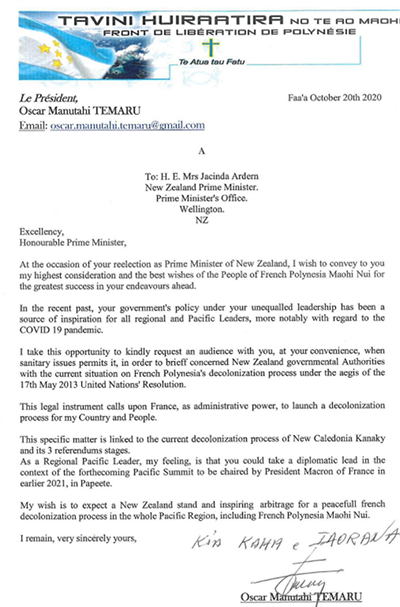
But Temaru questions French justice and will not back down even if it means requesting a meeting with New Zealand’s newly re-elected Prime Minister Jacinda Arden to assist a decolonisation programme that France has so far failed to discuss.
It is also at the back of Temaru’s mind that the decision to move the trial outside of Tahiti was designed and planned by the French judicial authorities to put yet another spanner in the works.
Financially, Temaru will need to meet the cost of an attorney to represent him; Temaru will not be physically able to be present at his own trial as New Caledonia is covid-19 free and has suspended all commercial flights until March 2021.
Popular sympathy might be less in New Caledonia with a bigger French proportion of the population (27 percent) than in French Polynesia (10 percent).
According to Temaru, France has not ceased “to put him on trial” and whatever the outcome this time, France will stick to the same agenda – and so will Temaru.
His fight for independence for the nuna’a Ma’ohi (Ma’ohi people) is a lifelong battle as he celebrates his birthday in Tahiti.
The last fighter of an era
The Tahitian pro-independence leader might be one of the last iconic figures of his generation who sits beside other political leaders, friends and sympathisers alive – or not – of the same era such as Jean-Marie Tjibaou (Kanaky New Caledonia), Walter Lini (Vanuatu), Henry Puna (Cook Islands).
Regardless of the verdict after the judgment, Temaru will be remembered as the force who will still stand up strong like Pouvana’a a O’opa against French neo-colonialism six decades ago.
Ena Manuireva is an Auckland University of Technology academic and PhD candidate who is from Mangareva, one of the French Polynesian islands most affected by the French nuclear tests for three decades until they ended in 1996. He wrote this article especially for the Pacific Media Centre’s Asia Pacific Report.
Notes:
1. France is never at its UN seat when the question of decolonising French Polynesia is on the agenda.
2. In 2019, the current territorial President Édouard Fritch was convicted and condemned for the same amount for arranging for the town administration of Pirae, where he was mayor, to pay for the water supply to the upmarket Erima neighbourhood, where longtime President Gaston Flosse lived.





